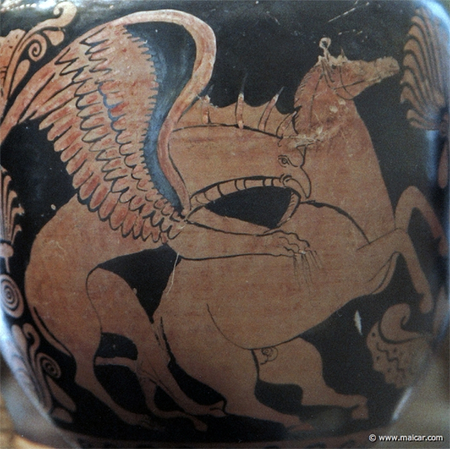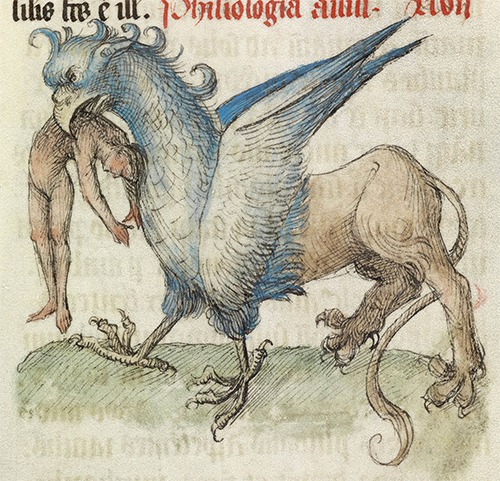Gryphon Lore
Since the sources of the Gryphon mythology are varied, so too is our knowledge of it. Here are a few of the characteristics of what makes a Gryphon a Gryphon:
Love of Gold
This is the most well known of all Gryphon characteristics, and quotes describing the Gryphon's love for gold can be found by nearly every person who has ever written of the beast. Some illustrate it through symbolism, as gold is symbolic of the Sun, and since Gryphons are sacred to the Sun the connection of the two would be natural. Others say that Gryphons, like many other birds, simply enjoy watching the gold and precious stones sparkle in the sunlight. It is also written that Gryphons have a natural instinct to find buried gold, emeralds, and other treasures. Yet regardless of why Gryphons enjoy gold, the fact remains that they did hoard the metal, and because of this, were much sought after by neighboring humans and Arimaspians. Aelian perhaps provides the most interesting description of the Gryphons and their gold hoarding nature.
Hatred of Horses and War with Arimaspians

Griffin attacking a horse. Ànfora de Lucania (Magna Grecia) 350 a.C. From maicar.com.
That Gryphons hate horses is also another well known fact, but the origin is less familiar, and though seemingly straightforward, requires a small introduction first.
The Arimaspians, whom I spoke of above, are the neighbors of the Gryphons in Scythia, usually by a river, and are peculiar in that they have only one eye. Sound familliar to a certain Greek one-eyed monster? That's because it is quite possible that the Greek Cyclopes were influenced by Aristeas's description of the Arimaspia. At first, the Arimaspians were simply almost gigantic one-eyed men, "fair haired" yet fierce and cruel. However they were also described as monsterous, scruffy and ugly, such as in this quote from Pliny.
"We have pointed out that some Scythian tribes, and in fact a good many, feed on human bodies... and that quite recently the tribes of the parts beyond the Alps habitually practiced human sacrifice, which is not far removed from eating human flesh. But also a tribe is reported next to these... the Arimaspi whom we have spoken of already, people remarkable for having one eye in the centre of the forehead."
Yet regardless of how the Arimaspians look and act, one fact remains constant: they are the relentless enemies of the Gryphons. It is written by many that the Arimaspians try to steal the gold guarded by the Gryphons, "both with remarkable covetousness".
Now back to the statement at hand, why Gryphons hate horses. This is simply because the Arimaspians were also noted equestrians, and consistantly attacked the Gryphons on horseback. This eventually led Gryphons to connect all horses with the Arimaspians, thus all things equine were their enemy. (Either that or maybe they just liked the taste of horse meat.)
War with Amazons
While not as renowned as their war with the Arimaspians, it has been written that Gryphons also waged war with the Amazons, the beautiful, seclusive, and ferocious warrior women. According to Sir G.W. Cox in his book, Mythology of the Aryan Nations,
"...[the Amazons are] mysterious beings, of whom it is enough to say that they are opposed or slaughtered not only by Theseus, but by Herakles, Achilleus, and Bellerophon..."
In other words, they appear as the constant opponents of Good and Light, i.e. Gryphons. The Gryphon's war with the Amazons is also representative of the Sun's eternal fight with the moon, (as well as male against female) each strong and obdurate, day in and day out. (The name "Amazon" derives from the Armenian word for "moon", maza.)
Immense Strength

Griffin (detail) from Book of Flowers, Koninklijke Bibliotheek, National Library of the Netherlands, ca 1460.
When Gryphons were first written about, it was assumed that they were about the size of lions (although Ctesias writes that they are "about as large as wolves"), yet had more strength than a normal lion would. According to Aelian,
"They engage too with other beasts and overcome them without difficulty, but they will not face the lion or the elephant."
and as stated by Philostratos,
"...they get the better of elephants and dragons... and the tiger alone is beyond their powers of attack..."
Gryphons are in fact so strong that many stories have been told of Gryphons plucking men, horses and oxen into the air with ease, such as in the Itinerary of Benjamin of Tudela. In the Pahlavi text, Bundahis, we find that
"The fourth genus [of living creatures] is the flying, of which the griffon of three natures is the largest."
Sir John Mandeville depicts the Gryphons' strength most aptly of all authors.
"But one griffin hath the body more great and is more strong than eight lions, of such lions as be on this half, and more great and strong than an hundred eagles such as we have amongst us. For one griffin there will bear, flying to his nest, a great horse, if he may find him at the point, or two oxen yoked together as they go at the plough. For he hath his talons so long and so large and great upon his feet, as though they were horns of great oxen or of bugles or of kine, so that men make cups of them to drink of."
An Agate Egg
The story of the agate egg is rare, but nevertheless, a part of Gryphon history. In fact, I have only been able to find one reference to it. According to Albertus Magnus,
"The stories also tell that griffins deposit agates in their nests because of the agate's special beneficial properties."
That is to say, Gryphons lay agate eggs. (Another translation of Albertus Magnus' work reads "In its nest the griffin lays the agate for its help and medicine.") It should be noted that Albertus was an alchemist, which may be a reason for his describing the egg so. ("Griffin's Egg" is also a term in modern alchemy. Check it out here.)
The Uses of Feathers and Claws
Like many other mythical beasts of the time, in the Middle Ages it was believed that the feathers and claws of a Gryphon has special magical powers. It is said that a poisoned liquid will change colors if served in a cup fashioned from a Gryphon's claw. The only way one could acquire a Gryphon's claw though, in legend, is by a holy man who cured a Gryphon of some illness and received the claw as payment for his kindness. A Gryphon's feather is said to be able to cure blindness.
© 2019 James Spaid. All rights reserved.